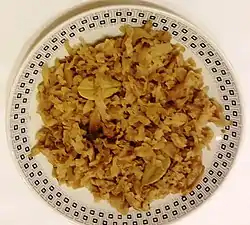Podvarak
Podvarak (Serbian Cyrillic: подварак) is a dish, popular across the countries of the former Yugoslavia.[1] The primary ingredients are sour cabbage or sauerkraut (подварак од киселог купуса) or fresh cabbage (подварак од слатког купуса), finely chopped onions and meat, usually pork roast or lightly cooked chicken, which are then combined and baked in an oven in order for all flavors to combine. It is considered poor man's food in parts of Serbia, Montenegro and Macedonia.[2] The dish is commonly seasoned with very finely chopped bacon (typically fried together with chopped onions), garlic, ground paprika and sometimes, but not commonly, tomato sauce or chopped sausage. Bacon is often used as flavoring even when the meat ingredient is chicken or turkey meat.
 Typical serving of podvarak | |
| Course | Main, side dish |
|---|---|
| Place of origin | Serbia |
| Region or state | Balkans |
| Serving temperature | Hot |
| Main ingredients | fresh cabbage or sauerkraut and meat |
| Variations | Multiple |
The meal is often made in larger quantities for family gatherings in the winter time (it is a common addition to the table at Christmas or family gatherings in the days after Christmas in both Serb and Croat communities in the area), and is used as both the main dish or as a meatless (made with bacon, onions and vegetables only) side dish.
In Bosniak Muslim communities in the Balkans, the dish is made without bacon or pork, with poultry, beef, or lamb; sometimes lamb pastrami or beef sujuk are used as cured, smoked flavoring for the dish.
Similar dishes
- Polish bigos is a similar dish, both meals probably stemming from common traditional Slavic sauerkraut predecessor dishes, with the main difference being that podvarak is always baked in the oven to caramelize meat and sauerkraut for deeper flavor, and sometimes baked in a sač, outdoors, for additional smokiness.
- Wedding cabbage is a traditional Serbian dish. The main ingredients are cabbage and a meat, which could be pork, bacon, lamb or mutton.
References
- Lois Sinaiko Webb (2000). Multicultural Cookbook of Life-cycle Celebrations. ABC-CLIO. ISBN 9781573562904.
